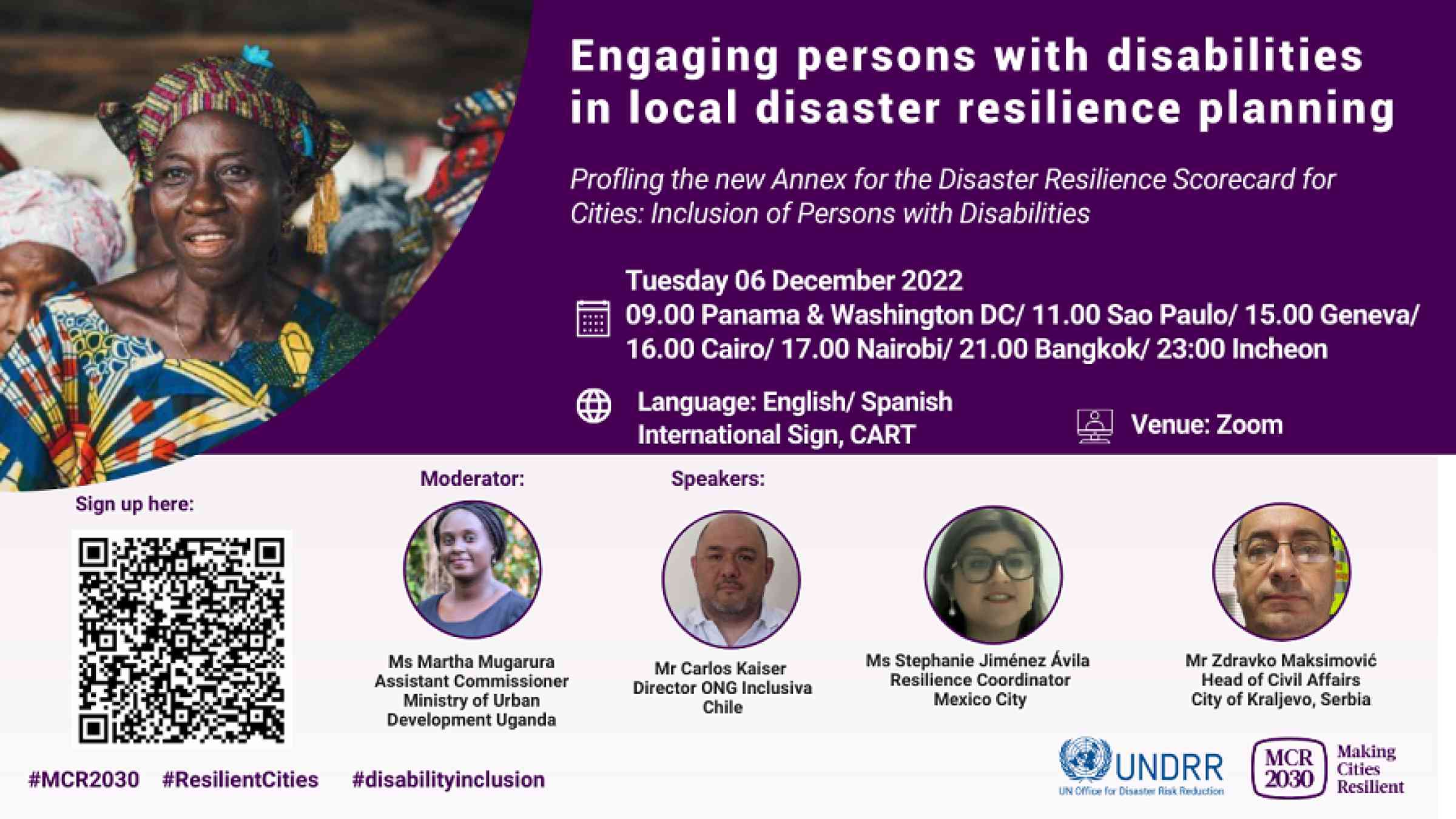New tool provides pathway for inclusion

A new tool enables local governments to design, formulate, and implement disaster resilience strategies that are more inclusive of the perspectives and capacities of persons with disabilities. The Annex for the Inclusion of Persons with Disabilities to the Disaster Resilience Scorecard for Cities provides an avenue for local governments to strengthen the engagement with their citizens who live with some form of disability.
A Making Cities Resilient 2030 (MCR2030) webinar to mark the release of the Annex highlighted how a more inclusive approach to disaster risk reduction is an investment and not a cost for resource-constrained municipalities. Moderator Martha Mugarura, Assistant Commissioner of the Ministry of Lands, Housing, and Urban Development, of the Government of Uganda, highlighted how in every disaster, a disproportionate number of persons with disabilities suffer and die. ‘Local disaster prevention measures are regularly designed and implemented without including persons with disabilities. Rarely are the unique perspectives and contributions of these communities engaged in local efforts to reduce disaster risk,’ Ms Mugarura said.
The overall architect of the development of the Annex to the Scorecard for the Inclusion of Persons with Disabilities, Mr Carlos Kaiser Mansilla, the Director of ONG Inclusiva, in Chile, said: ‘I have been waiting for this day with a lot of energy and passion as it is very important to advocate for a world that is inclusive for everyone. ‘I used to be an official of a local government in Chile, so I know we needed to create something that is easy to use but at the same time capable of dealing with the complexity of answering the needs of people living with disabilities.’
Mr Zdravko Maksimović, Head of Department of Civil Protection Affairs, City of Kraljevo, in Serbia, said a series of disasters from 2010 made his municipality realize that ‘it was beginning to pay the price for climate change and a lack of investment in prevention’ and that the disaster risk governance system was ‘blind’ to the perspectives and needs of persons with disabilities. ‘We have learnt that all partnerships should be strategic and institutionalized and we have prioritized engagement with associations representing persons living with disabilities to strengthen their inclusion and benefit from their experiences,’ he said.
Ms Stephanie Jiménez, the Resilience Actions and Policies Coordinator, of Mexico City – one of MCR2030’s Resilience Hubs – made the point that strengthening inclusion is not just about addressing vulnerability but also about opportunities and increasing capacity. ‘Meaningful and effective participation demands time, accountability and is complex but brings genuine benefits. We have a responsibility to transform our cities so that they are safe, accessible, and welcoming to everyone, including persons with disabilities,’ she said.
The United Nations Office for Disaster Risk Reduction’s (UNDRR) Disaster Resilience Scorecard for Cities or the Scorecard enables local governments to assess their strengths and gaps in terms of the Ten Essentials for Making Cities Resilient. The Scorecard provides a baseline analysis that supports the preparation of local disaster resilience strategies. The Annex for the Inclusion of Persons with Disabilities is now available online at the MCR2030 website. The Sendai Framework for Disaster Risk Reduction makes the case for an inclusive, accessible, all-of-society approach to protect lives, livelihoods, and wellbeing as being the most effective pathway towards resilient and sustainable cities.
Making Cities Resilient 2030 is a global partnership that has mobilized more than 1,476 local governments, representing over 458 million people, that have committed to strengthening their disaster and climate resilience.
The online annex is available here.

